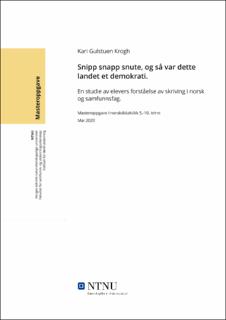| dc.description.abstract | I dag blir det å kunne forholde seg til tekst sett på som en av de viktigste ferdighetene mennesker må ha for å kunne ta del i demokratiet og samfunnet. Å kunne forholde seg til tekst krever en grunnleggende literacy, der skrivekompetanse er et sentralt element. Med fagfornyelsen har demokrati og medborgerskap blitt innført som et tverrfaglig tema som skal arbeides med både på fagenes premisser og på tvers av fag. I omtalen av temaet er det beskrevet at elevene skal utvikle sine skriftlige ferdigheter, slik at de skal kunne delta i samfunnsliv og demokratiske prosesser. Norskfaget har et overordnet ansvar for utviklingen av skrivekompetansen, og i samfunnsfag er demokrati et helt sentralt tema. I denne masteroppgaven har jeg undersøkt hvilken forståelse av skriving i norsk og samfunnsfag som kommer til uttrykk gjennom tekstproduksjon og i samtaler om tekst og fagskriving hos et utvalg elever fra 7. og 9. trinn. Samtidig har jeg gjennomgående hatt et blikk på læreplanen, hvilke føringer for opplæring i skriving den legger opp til, samt hvordan føringene samsvarer med elevenes tanker om og forståelse av skriving.
For å kunne svare på problemstillingen har jeg latt fire klasser svare på samme skriveoppdrag med temaet demokrati, der to klasser har skrevet i norskfaglig kontekst, og to klasser i samfunnsfaglig kontekst. Videre gjennomførte jeg tekstsamtaler med et utvalg av elevene. I tekstsamtalene uttrykte elevene en relativt smal forståelse av skriving, der rettskriving i norskfaget, og det å skriv om fakta eller om begrep i samfunnsfag, sto fram som sentralt. Likevel viser elevene i tekstene de har skrevet at de mestrer ulike teksttyper og skrivemåter i begge fag, at de kan skrive rett i både norsk og samfunnsfag, og at de kan vise fagkunnskaper gjennom både eventyr og faktasetninger. Det er derfor en viss avstand mellom deres forståelse av skriving, og den faktiske skrivekompetansen. Dette kan tolkes som at elevene i stor grad har en nytteforståelse av skrivekompetansen, mens danningsdimensjonen, som er sentral i læreplanene både i norsk, samfunnsfag og i de fagovergripende føringene, ikke er like synlig. Gjennomgående viste elevene også mye kunnskap om demokrati og demokratiske prosesser, men reflekterte i mindre grad over hva demokrati betyr for dem, og krever av dem. Med bakgrunn i disse funnene tar jeg til orde for at om elevene skal kunne utvikle sin skrivekompetanse og demokratiforståelse utover dette, må man legge vekt på å hjelpe elevene å opparbeide en metaforståelse av skriving, og i større grad legge til rette for at de kan reflektere over hvorfor de skriver, og hva hensikten er med skrivingen, både i avgrensede skriveoppdrag på skolen, og som bidrag til demokrati- og samfunnsdeltakelse. | |
| dc.description.abstract | Today, being able to relate to text is seen as one of the most important skills an individual must have in order to participate in democracy and society. Being able to relate to text requires basic literacy, in which writing is a key element. With the renewal of the curriculum, democracy and citizenship have been introduced as an interdisciplinary topic, which should be weighted both in the subjects and across the subjects. The synopsis of the topic, emphazise that students should develop their writing skills, so they can participate in society and in democratic processes. The Norwegian subject has an overall responsibility for the students development of writing, while democracy is a key issue in Social Sciences. In this master's thesis I have explored a selection of 7th and 9th grade students understanding of writing in the Norwegian subject and in Social Sciences, expressed through their produced text and in conversations about their text and subject writing. Simultaneously, I have examined how the curriculum describes education in writing, and how the guidelines correspond to students' conception and understanding of writing.
In order to answer this question, four classes have responded to the same writing assignment with the democracy as its subject matter, in which two classes wrote in a Norwegian subject context, and the other two classes wrote it in a Social Science context. Furthermore, I conducted text conversations with a selection of students. In the text conversations, students expressed a relatively narrow understanding of writing, as spelling in the Norwegian subject, and writing facts or writing about concepts in Social Sciences. Nevertheless, in their text, the students showed that they master different types of text and writing in both subjects, that they can spell in both Norwegian and Social Sciences, and that they can show subject knowledge through both fairytales and factual sentences. In other words, there is a distance between their understanding of writing, and their actual writing. This can be interpreted as an understanding of writing as a tool, while the concept of bildung, which is central to the curriculums in the Norwegian subject, Social Sciences and in the interdiciplinary guidelines, is not as visible. Consistently, students also showed a lot of knowledge about democracy and democratic processes. Based on these findings, I advocate that if students are going to be able to develop their writing skills and understanding of democracy beyond this, one must emphasize helping students gain a meta-understanding of writing, and to a greater extent facilitate that students can reflect on why they write, and what the purpose of the writing is, both in limited writing assignments at school, and as a contribution to democracy and participation in society. | |
